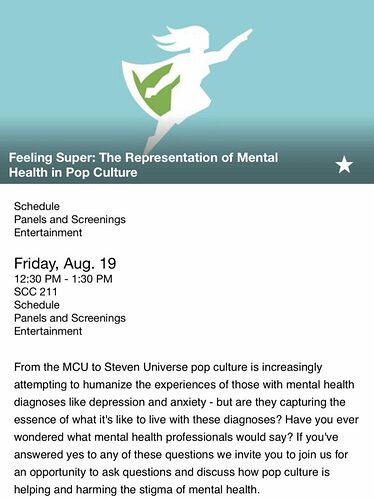Originally published at: My Insights from "Feeling Super: The Representation of Mental Health in Pop Culture" Panel at Emerald City Comic Con 2022 - People of Con
Emerald City Comic Con 2022
Author: Xavier Scudder
On Friday, August 19th, 2022, I had the privilege of attending a thought-provoking panel at the Emerald City Comic Con in room SCC211. The panel, titled “Feeling Super: The Representation of Mental Health in Pop Culture,” brought together a diverse group of mental health professionals and enthusiasts for a rich discussion on portraying mental health in pop culture.
One of the key points that resonated with me was the depiction of Post-Traumatic Stress Disorder (PTSD) in Marvel movies. The panelists appreciated how these films humanize superheroes by showing them grappling with their feelings and experiences in the aftermath of traumatic events. This representation, they argued, helps to normalize discussions around mental health and breaks away from the stereotype of invincible heroes.
The conversation also delved into the societal structures contributing to mental health issues. The panelists discussed the impact of capitalism on mental health, highlighting how societal pressures and expectations can lead to mental distress. They argued that the current system often makes people miserable, and this mental health aspect is not adequately addressed in pop culture.
The panelists also touched on the controversial topic of medication for mental health. They critiqued narratives in some media that suggest stopping medication can lead to reaching one’s full potential. They emphasized that this is not the case for many people and that such narratives can be harmful.
The need for more representation of lived experiences was another significant point of discussion. The panelists wanted to see more origin stories that help people understand that their mental health conditions are not their fault. They argued that such narratives could help reduce the stigma associated with mental health issues.
The panelists also discussed acknowledging and normalizing mental health conditions as disabilities. They argued that mental health conditions could prevent people from fully participating in society and that society should be more understanding and accommodating of these conditions.
Finally, the panelists discussed the role of gender roles in portraying mental health in media. They critiqued the prevalence of stereotypical gender roles, such as men being expected to hide their feelings and women being portrayed as strong when they hide their pain.
The “Feeling Super: The Representation of Mental Health in Pop Culture” panel was a powerful reminder of the influence of pop culture in shaping societal attitudes towards mental health. It highlighted the need for more authentic, nuanced, and diverse representations of mental health in media.
